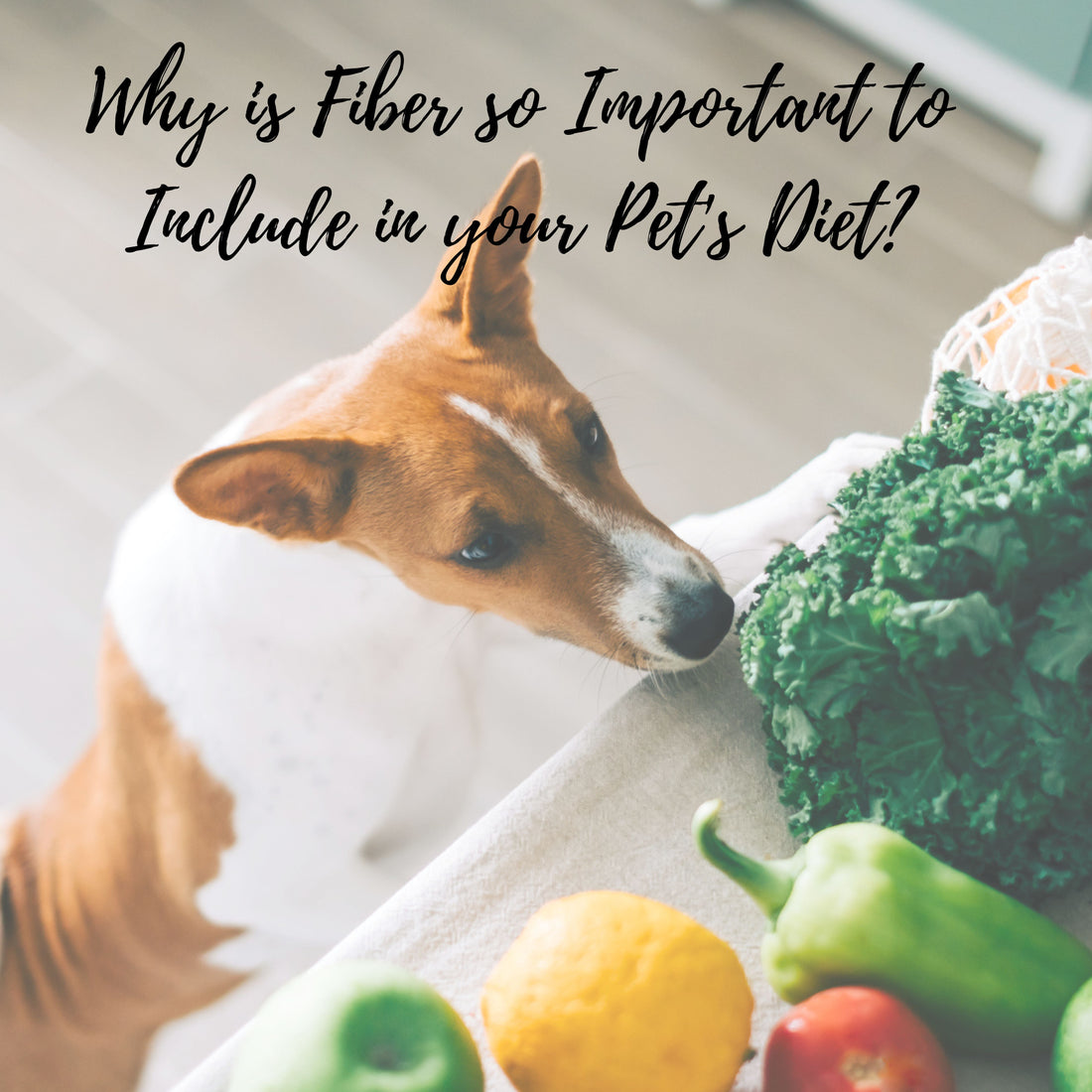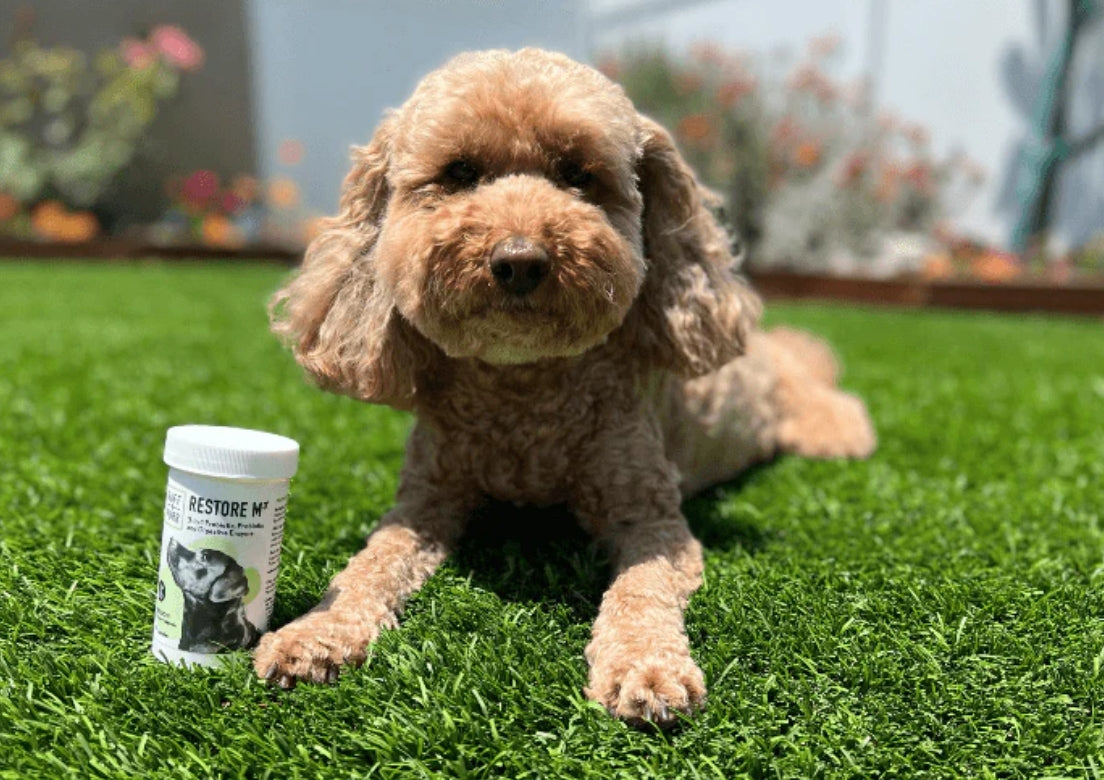When it comes to our beloved pets' nutrition, we often focus on essential nutrients like protein, carbohydrates, and fat. However, there is another vital component that should not be overlooked: fiber.

Fiber, in the context of diet and nutrition, refers to a type of carbohydrate that cannot be fully digested by the digestive system. It is primarily found in plant-based foods such as fruits, vegetables, whole grains and legumes.
Unlike the other more digestible carbohydrates, fiber passes through the digestive tract largely intact, providing a range of health benefits due to how the body metabolizes it. In addition, fiber helps improve the performance of probiotics giving them food.
While not classified as an essential nutrient, fiber plays a crucial role in ensuring the longevity and well-being of our dogs and cats. In this article, we will explore the benefits of incorporating fiber into your pet's diet, from promoting a healthier gut to enhancing nutrient absorption, and how it can contribute to their overall health and quality of life.
Benefit #1: Promotes a Healthier Gut:
Just like fertilizer nourishes a lawn, fiber acts as nourishment for the beneficial microbes in your pet's gut. When your pet consumes an adequate amount of fiber, it allows the good bacteria in their gut to thrive while deterring the bad microbes that do not consider fiber as food. By including fibrous foods into their diet, such as vegetables, fruits, and whole grains, you can increase the population of beneficial microbes and eliminate the harmful ones. This balance in gut flora contributes to a healthier gastrointestinal system and overall well-being.
Benefit #2: Reduces Odor and Facilitates Waste Management:
One of the unpleasant side effects of poor digestion can be foul-smelling feces or flatulence. However, by ensuring a higher ratio of fiber to protein in your pet's diet, you can help reduce these odor issues. Fiber supports the growth of good microbes in the gut and suppresses the bad ones, resulting in less production of protein by-products that contribute to unpleasant smells. As a result, both your dog's or cat's breath and their waste will be fresher and more manageable. Whether it's cleaning up after them in the litter box or taking them for a walk on the grass, you'll appreciate the difference fiber makes.
Benefit #3: Enhances Nutrient Absorption:

Studies have shown that pets consuming a diet rich in fiber have better nutrient digestibility. When they consume a higher proportion of fiber compared to excessive protein, the fiber nourishes the beneficial microbes in the gut, leading to a significant boost in gut health and overall digestion, including protein digestion. Improved digestion paves the way for better nutrient absorption, ensuring that your pet derives maximum benefits from their food. As a result, they experience stronger recovery from illness or exercise and enjoy a slower aging process.
Incorporating Fiber into Your Pet's Diet
Now that we understand the benefits of fiber for our furry friends, let's discuss how to incorporate it into their diet effectively:

-
Choose Fiber-Rich Foods: Opt for high-fiber options such as vegetables (carrots, broccoli, green beans), fruits (apples, bananas, berries), and whole grains (brown rice, quinoa). These foods are not only nutritious but also provide a good amount of fiber to support your pet's health.
-
Gradual Introductions: When introducing fiber-rich foods, it's essential to do so gradually. Sudden dietary changes can upset your pet's digestive system. Start by adding small amounts of fiber-rich foods to their regular meals and gradually increase the portions over time. This allows their gut to adjust to the dietary changes smoothly.
- Consult with Your Veterinarian: Each pet is unique, and their dietary requirements may vary based on factors such as age, breed, and health conditions. It's always a good idea to consult with your veterinarian to determine the ideal amount of fiber for your pet's specific needs. They can provide personalized recommendations and guide you on the best way to incorporate fiber into their diet.
While fiber may not be classified as an essential nutrient, its importance in your pet's diet cannot be overstated. Incorporating fiber-rich foods into their meals provides numerous benefits, including promoting a healthier gut, reducing odor and waste management issues, and enhancing nutrient absorption. By ensuring an adequate fiber intake, you can contribute to your pet's overall well-being, supporting their long-term health and helping them live a vibrant and fulfilling life. Remember, a small dietary change can make a significant difference in your pet's health and longevity, so why not start incorporating fiber into their diet today?
Sources:
How Fiber Enhances Stool Quality and Health in Dogs
https://journals.plos.org/plosone/article/file?id=10.1371/journal.pone.0054405&type=printable
Fecal Microbiome Analysis of Dogs Fed Fiber in their Diets
https://journals.plos.org/plosone/article?id=10.1371/journal.pone.0009768


